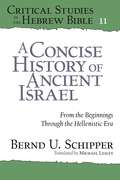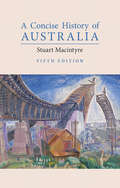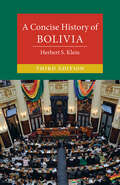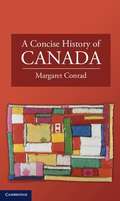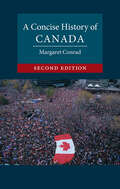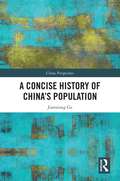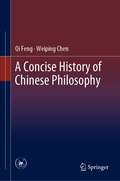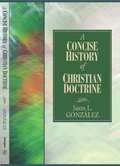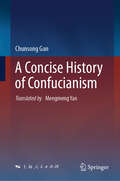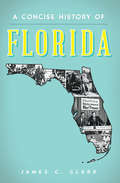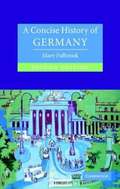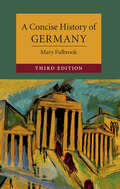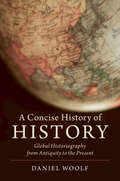- Table View
- List View
A Concise History of Ancient Israel: From the Beginnings Through the Hellenistic Era (Critical Studies in the Hebrew Bible #11)
by Bernd U. SchipperThe history of biblical Israel, as it is told in the Hebrew Bible, differs substantially from the history of ancient Israel as it can be reconstructed using ancient Near Eastern texts and archaeological evidence. In A Concise History of Ancient Israel, Bernd U. Schipper uses this evidence to present a critical revision of the history of Israel and Judah from the late second millennium BCE to the beginning of the Roman period. Considering archaeological material as well as biblical and extrabiblical texts, Schipper argues that the history of "Israel" in the preexilic period took place mostly in the hinterland of the Levant and should be understood in the context of the Neo-Assyrian expansion. He demonstrates that events in the exilic and postexilic periods also played out differently than they are recounted in the biblical books of Ezra and Nehemiah. In contrast to previous scholarship, which focused heavily on Israel’s origins and the monarchic period, Schipper’s history gives equal attention to the Persian and early Hellenistic periods, providing confirmation that a wide variety of forms of YHWH religion existed in the Persian period and persisted into the Hellenistic age.Original and innovative, this brief history provides a new outline of the historical development of ancient Israel that will appeal to students, scholars, and lay readers who desire a concise overview.
A Concise History of Ancient Israel: From the Beginnings Through the Hellenistic Era (Critical Studies in the Hebrew Bible)
by Bernd U. SchipperThe history of biblical Israel, as it is told in the Hebrew Bible, differs substantially from the history of ancient Israel as it can be reconstructed using ancient Near Eastern texts and archaeological evidence. In A Concise History of Ancient Israel, Bernd U. Schipper uses this evidence to present a critical revision of the history of Israel and Judah from the late second millennium BCE to the beginning of the Roman period. Considering archaeological material as well as biblical and extrabiblical texts, Schipper argues that the history of “Israel” in the preexilic period took place mostly in the hinterland of the Levant and should be understood in the context of the Neo-Assyrian expansion. He demonstrates that events in the exilic and postexilic periods also played out differently than they are recounted in the biblical books of Ezra and Nehemiah. In contrast to previous scholarship, which focused heavily on Israel’s origins and the monarchic period, Schipper’s history gives equal attention to the Persian and early Hellenistic periods, providing confirmation that a wide variety of forms of YHWH religion existed in the Persian period and persisted into the Hellenistic age.Original and innovative, this brief history provides a new outline of the historical development of ancient Israel that will appeal to students, scholars, and lay readers who desire a concise overview.
A Concise History of Australia
by Stuart MacintyreAustralia is the last continent to be settled by Europeans, but it also sustains a people and a culture tens of thousands years old. For much of the past 200 years the newcomers have sought to replace the old with the new. This book tells how they imposed themselves on the land, and brought technology, institutions and ideas to make it their own. It relates the advance from penal colony to a prosperous free nation and illustrates how, as a nation created by waves of newcomers, the search for binding traditions was long frustrated by the feeling of rootlessness, until it came to terms with its origins. The third edition of this acclaimed book recounts the key factors - social, economic and political - that have shaped modern-day Australia. It covers the rise and fall of the Howard government, the 2007 election and the apology to the stolen generation. More than ever before, Australians draw on the past to understand their future.
A Concise History of Australia (Cambridge Concise Histories)
by Stuart MacintyreStuart Macintyre, one of Australia's most highly regarded historians, revisits A Concise History of Australia to provoke readers to reconsider Australia's past and its relationship to the present. Integrating new scholarship with the historical record, the fifth edition of A Concise History of Australia brings together the long narrative of Australia's First Nations' peoples; the arrival of Europeans and the era of colonies, convicts, gold and free settlers; the foundation of a nation state; and the social, cultural, political and economic developments that created a modern Australia. As we enter the third decade of the twenty-first century, Macintyre's Australia remains one of achievements and failures. So too the future possibilities are deeply rooted in the country's past endeavours. A Concise History of Australia is an invitation to examine this past.
A Concise History of Austria
by Steven BellerFor a small, prosperous country in the middle of Europe, modern Austria has a very large and complex history, extending far beyond its current borders. Today's Austrians have a problematic relationship with that history, whether with the multi-national history of the Habsburg Monarchy, or with the time between 1938 and 1945 when Austrians were Germans in Hitler's Third Reich. Steven Beller's gripping and comprehensive account traces the remarkable career of Austria through its many transformations, from German borderland, to dynastic enterprise, imperial house, Central European great power, failed Alpine republic, German province, and then successful Alpine republic, building up a picture of the layers of Austrian identity and heritage and their diverse sources. It is a story full of anomalies and ironies, a case study of the other side of European history, without the easy answers of more clearly national narratives, and hence far more relevant to today's world.
A Concise History of Bolivia (Cambridge Concise Histories)
by Herbert S. KleinBolivia is an unusually high-altitude country created by imperial conquest and native adaptions – today, it remains one of the most multi-ethnic societies in the world with one of the largest Amerindian populations in the Americas. It has seen the most social and economic mobility of Indian and mestizo populations in any country in Latin America. This work, having also appeared in Spanish, Portuguese, Japanese and Chinese in its earlier editions, has become the standard survey of the history of Bolivia. In this new edition, Klein explores the changes that occurred in the past two decades under the leadership of Evo Morales and his indigenous government, and how his party has emerged in the post-Evo years as one of the most important in Bolivia. The work also expands on the changes in both the traditional mining economy and the rise of a new commercial export agriculture.
A Concise History of Bolivia, Second Edition
by Herbert S. KleinA Concise History of Bolivia, Second Edition
A Concise History of Brazil
by Boris Fausto Sergio Fausto Arthur Brakel Boris Fausto Sergio Fausto Arthur BrakelA Concise History of Brazil covers almost 500 years of Brazilian history, from the arrival of the Portuguese in the New World to the political events that defined the transition in recent years from an authoritarian to a democratic political regime. Brazilian territorial unity and national identity were forged throughout the nineteenth century, after the proclamation of independence in 1822, resulting in a nation with one common language and wide ethnic and racial variety. Remarkable in this respect, the country nevertheless faces problems of social and ethnic disparity as well as of preservation and adequate use of its natural resources. This book emphasizes topics that have deeply influenced the historical formation of Brazil and affected its existence to the present day, such as the destruction of Indian civilizations, slavery and massive immigration throughout the last decades of the nineteenth century and the first decades of the twentieth century.
A Concise History of Britain 1707-1975
by W. A. SpeckThis book provides a concise, illustrated history of Great Britain over the past three centuries, from its formation as a sovereign state between the Union of England and Scotland in 1707 to its partial loss of sovereignty in the accession to the European Community, confirmed in the referendum result of 1975. Professor Speck emphasises political and social trends. In particular he argues that conservative politics prevailed largely in a deeply conservative society, and that reactionary causes generally obtained more support than radical campaigns. The book is highly illustrated with pictures and photographs and contains a bibliography and other features of use to students and general readers.
A Concise History of Bulgaria (2nd Edition)
by R. J. CramptonThis concise history traces Bulgaria's growth from pre-history, through its days as the center of a powerful medieval empire and five centuries of Ottoman rule, to the political upheavals of the twentieth century which led to three wars. It highlights 1995 to 2004, a vital period during which Bulgaria endured financial meltdown, set itself seriously on the road to reform, elected its former King as prime minister, and finally secured membership in NATO and admission to the European Union.
A Concise History of Canada
by Margaret ConradMargaret Conrad's history of Canada begins with a challenge to its readers. What is Canada? What makes up this diverse, complex, and often contested nation-state? What was its founding moment? And who are its people? Drawing on her many years of experience as a scholar, writer, and teacher of Canadian history, Conrad offers astute answers to these difficult questions. Beginning in Canada's deep past with the arrival of its Aboriginal peoples, she traces its history through the conquest by Europeans, the American Revolutionary War, and the industrialization of the nineteenth and twentieth centuries, to its prosperous present. Despite its successes and its popularity as a destination for immigrants from across the world, Canada remains a curiously reluctant player on the international stage. This intelligent, concise, and lucid book explains just why that is.
A Concise History of Canada (Cambridge Concise Histories)
by Margaret ConradMargaret Conrad's history of Canada explains what makes up this diverse, complex, and often contested nation-state. Beginning in Canada's deep past with the arrival of its Indigenous peoples, she traces its history through the conquest by Europeans, the American Revolutionary War, and Confederation in the nineteenth century to its prosperous present. This impressive second edition has expanded by 20 percent, including revised chapters and an insightful analysis of the fraught relationship between Justin Trudeau and Donald Trump. As a social historian, Conrad emphasizes the relationships between Indigenous peoples and settlers, French and English, Catholic and Protestant, men and women, rich and poor. It is this grounded approach that drives the narrative and makes for compelling reading. Despite its successes and its popularity as a destination for immigrants from across the world, Canada remains a cautious and contested country. This thorough yet concise new edition explains why.
A Concise History of China’s Population (China Perspectives)
by Jianxiong GeThis book provides a comprehensive overview and explanation of China’s population, analyzing its special characteristics and patterns of growth over the past 2,000 years. Topics include its composition, distribution, migration, and deep analysis into China’s historical population. The author aims to answer complicated questions such as how China’s population was formed, when China started its earliest population surveys, how China’s population migrated and was distributed historically, and how existing population data should be evaluated and used now? In addition, the author explores the influence of natural and human-caused disasters, censuses, tax policies, and economic development on China’s population changes. The work also offers a span of rich historical detail related to population control. The book will be a great read to students and scholars of population studies, Chinese studies, ethnology, and those who are interested in Chinese history, archaeology, geography, and sociology.
A Concise History of Chinese Philosophy
by Qi Feng Weiping ChenThis book is an abridged version of Feng Qi’s two major works on the history of philosophy, The Logical Development of Ancient Chinese Philosophy and The Revolutionary Course of Modern Chinese Philosophy. It is a comprehensive history of Chinese philosophy taking the reader from ancient times to the year 1949. It illuminates the characteristics of traditional Chinese philosophy from the broader vantage point of epistemology. The book revolves around important debates including those on “Heaven and humankind” (tian ren天人), “names and actualities” (mingshi名實), “principle and vital force” (liqi理氣), “the Way and visible things” (daoqi道器), “mind and matter/things” (xinwu心物), and “knowledge and action” (zhixing知行). Through discussion of these debates, the course of Chinese philosophy unfolds. Modern Chinese philosophy has made landmark achievements in the development of historical and epistemological theory, namely the “dynamic and revolutionary theory of reflection”. However, modern Chinese philosophy is yet to construct a systematic overview of logic and methodology, as well as questions of human freedom and ideals. Amid this discussion, the question of how contemporary China is to “take the baton” from the thinkers of the modern philosophical revolution is addressed.
A Concise History of Christian Doctrine
by Justo L. GonzalezAn introduction to the core Christian doctrines, the historical context in which they arose, and their ongoing importance to contemporary Christian belief and practice.Justo González has long been recognized as one of our best teachers and interpreters of the church’s belief and history. In this new volume he lays out the answers to three questions crucial to understanding the Christian tradition: First, what are the core Christian doctrines? What ideas and convictions form the heart of Christian identity? Second, Where did these doctrines come from? What are the historical contexts in which they first rose to prominence? How have they developed across the history of the church? Finally, what do these doctrines mean today? What claims do they continue to place on Christian belief and practice in the twenty-first century?Written with the clarity and insight for which González is famous, A Short History of Christian Doctrine will serve the needs of students in church history, historical theology, and systematic theology classes in college/university settings, as well as seminaries/theological schools.
A Concise History of Confucianism
by Chunsong GanThis book is a readable and insightful analytical work that steadily traces and analyzes the historical development of Confucianism in China. This book is structured chronologically and discusses the developing positions of Confucianism across different periods in the Chinese history. Each chapter focuses on a number of key questions and perspectives pertaining to Confucian thoughts and ideas, for example, &‘Benevolence&’ and &‘Propriety&’ in Pre-Qin Confucianism, studies of Mencius and Xunzi, and Dong Zhongshu of the Han Dynasty . In addition, this book pays special and extensive attention to ideas of New Confucianism, its concepts, and formation. This book is written in a simple yet comprehensible style. It aims to broaden and deepen studies of Confucianism via its stage-by-stage discussion about the historical development of Confucian thoughts. Both academic specialists and ordinary readers will find the book helpful and inspiring in its clear and vivid delineation, analysis, and debate about the essence, function, and role of Confucianism in traditional and modern societies alike.
A Concise History of Finland
by David KirbyFew countries in Europe have undergone such rapid social, political and economic changes as Finland has during the last fifty years. David Kirby here sets out the fascinating history of this northern country, for centuries on the east-west divide of Europe, a country not blessed by nature, most of whose inhabitants still earned a living from farming fifty years ago, but which today is one of the most prosperous members of the European Union. He shows how this small country was able not only to survive in peace and war but also to preserve and develop its own highly distinctive identity, neither Scandinavian nor Eastern European. He traces the evolution of the idea of a Finnish national state, from the long centuries as part of the Swedish realm, through self-government within the Russian Empire, and into the stormy and tragic birth of the independent state in the twentieth century.
A Concise History of Florida (Brief History Ser.)
by James C. ClarkA quick overview of the Sunshine State&’s fascinating past, with photos and illustrations included. In 1513, Spanish explorer Juan Ponce de León first set foot on Florida&’s east coast. The land he discovered was a geographic anomaly so distinctive that one day, centuries later, astronaut Neil Armstrong would say that Florida was the first shape on earth he recognized on his return from a visit to the moon. This unique state has witnessed such momentous events as the 1959 arrival of the first Cuban exiles under Fidel Castro and the 1981 launch of the Columbia—the first space shuttle. Join historian James C. Clark as he chronicles the surprising history of the Sunshine State in this concise and captivating book.
A Concise History of France
by Roger PriceThis book provides a clear and well-informed guide to French history from the emergence of a strong state in the Ile-de-France in the early middle ages, to the trente glorieuses following the Second World War and the Mitterrand presidency. As such, it provides the most up-to-date and comprehensive study of French history available. Among the book's central themes are the relationship between state and society, the impact of war and such crucial questions as who possessed political power, how this power was used, in whose interests, and with what consequences. Roger Price examines the role of leading figures including Philip Augustus, Henri IV, Louis XIV, the two Napoleans, Clemenceau and De Gaulle as well as the lives of ordinary people. A rich entertaining guide for the student and general reader.
A Concise History of Germany
by Mary FulbrookA new edition of Mary Fulbrook's history of Germany from the middle ages to today.
A Concise History of Germany
by Mary FulbrookThis book provides a clear and informative guide to the twists and turns of German history from the early middle ages to the present day. The multi-faceted, problematic history of the German lands has provided a wide range of debates and differences of interpretation. Mary Fulbrook provides a crisp synthesis of a vast array of historical material, and explores the interrelationships between social, political and cultural factors in the light of scholarly controversies. First published in 1990, A Concise History of Germany appeared in an updated edition in 1992, and in a second edition in 2004. It is the only single-volume history of Germany in English which offers a broad, general coverage. It has become standard reading for all students of German, European studies and history, and is a useful guide to general readers, members of the business community and travellers to Germany.
A Concise History of Germany (Cambridge Concise Histories)
by Mary FulbrookThis third edition of Mary Fulbrook's much-admired and popular introduction to German history provides a clear and informative guide to the twists and turns of the story of the German lands and peoples from the early middle ages to the present day. Crisply synthesising a vast array of historical material, Fulbrook explores the interrelationships between social, political and cultural factors in the light of scholarly controversies. Since the second edition in 2004, there have been important changes in Germany, Europe and the wider world. This new edition features a significantly expanded chapter on Germany since 1990, encapsulating recent and dramatic developments that have transformed Germany's character and international standing. This single-volume history of Germany offers broad and accessible coverage and provides a useful guide for students, general readers, travellers to Germany and anyone with an interest in German history.
A Concise History of Greece
by Richard CloggThis book provides a concise, illustrated introduction to the history of modern Greece, from the first stirrings of the national movement in the late eighteenth century to the present day. It is designed to provide a basic introduction for general and academic readers with little or no prior knowledge of the subject, and supersedes Professor Clogg's Short History of Modern Greece which has become a classic since its initial publication in 1979. This latest account is a wholly new book, conceived afresh for a broad readership, in which the many illustrations with their extensive captions form an important part of the text.
A Concise History of History: Global Historiography from Antiquity to the Present (Cambridge Concise Histories Ser.)
by Daniel WoolfThis short history of history is an ideal introduction for those studying or teaching the subject as part of courses on the historian's craft, historical theory and method, and historiography. Spanning the earliest known forms of historical writing in the ancient Near East right through to the present and covering developments in Europe, Asia, Africa and the Americas, it also touches on the latest topics and debates in the field, such as 'Big History', 'Deep History' and the impact of the electronic age. It features timelines listing major dynasties or regimes throughout the world alongside historiographical developments; guides to key thinkers and seminal historical works; further reading; a glossary of terms; and sample questions to promote further debate at the end of each chapter. This is a truly global account of the process of progressive intercultural contact that led to the hegemony of Western historiographical methods.
A Concise History of Hungary
by Miklós MolnárThis book offers a comprehensive thousand-year history of the land, people, society, culture and economy of Hungary, from its nebulous origins in the Ural Mountains to the 1988 elections. It tells above all the thrilling story of a people who became a great power in the region and then fought against--and were invaded by--Ottomans, Germans and Soviets. The Hungarian people preserved nevertheless a continuous individuality through their Ural-born language and a specifically Hungaro-European culture.
